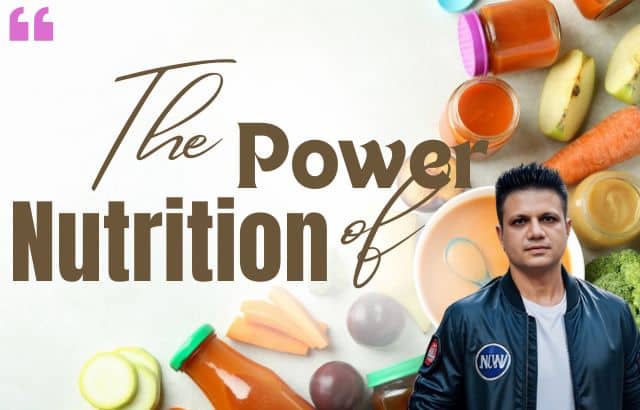The Secret Sauce to Success? Nutrition!- What if we told you the key to unlocking your career potential is something you can literally chew on? Yep, you heard that right—your lunch break might just be the most important part of your workday. Whether you’re hustling through a never-ending to-do list, preparing for an important meeting, or trying to nail that big project, the food you put in your body plays a starring role in how well you perform.
No, it’s not magic—it’s nutrition. Think of it as your personal fuel that powers everything from your brain’s focus to your body’s stamina. A balanced diet is like the ultimate productivity hack, and guess what? You don’t even need to install an app for it. Just add the right nutrients to your plate, and watch your energy, efficiency, and even your mood level up.
So, what’s the best recipe for success? Let’s dive in!
Table of Contents
What is Nutrition?
Hirav Shah, celebrated Astro Strategist and Business Astrologer, aptly explains: “Nutrition refers to the supply of materials, especially food, required by the cells and organisms of our body to stay alive. Nutrition is not just about consuming food but about providing our bodies with the right food in the right amounts.”
At its core, nutrition is the science or practice of consuming essential foods and nutrients that our body needs to function at its optimal level. It’s not just about eating; it’s about eating right.
Two Types of Nutrition
Autotrophic Nutrition: This is a process where certain organisms, like plants and bacteria, create their own food from inorganic substances using light energy from the sun. This is how green plants make their own food from carbon dioxide and water.
Heterotrophic Nutrition: In contrast, humans and animals depend on consuming other organisms (plants or animals) for food. We get our nutrition by feeding on plants, animals, or both.
The Importance of Nutrients
To stay healthy, our bodies require several essential nutrients. Hirav Shah reminds us that these nutrients can be divided into two broad categories:
- Macronutrients: Required in large amounts for energy and growth, including carbohydrates, proteins, and fats.
- Micronutrients: Needed in small amounts, but essential for overall health, including vitamins and minerals.
The Essential Nutrients Your Body Needs
A well-balanced diet is about variety—ensuring that you get all the essential nutrients your body needs to thrive. Let’s break down the nutrients and the foods that provide them:
| Nutrient | Food Sources | Role in the Body |
|---|---|---|
| Carbohydrates | Whole grains, fruits, vegetables, legumes | Provide energy, support brain function, and regulate blood sugar |
| Proteins | Chicken, beans, fish, eggs, tofu | Build and repair tissues, make enzymes and hormones |
| Fats | Avocados, olive oil, nuts, seeds, fatty fish | Provide energy, store vitamins, and protect organs |
| Vitamins | Fruits, vegetables, dairy, nuts | Vital for immune function, skin health, and energy production |
| Minerals | Meat, dairy, nuts, leafy greens | Crucial for bone health, nerve function, and red blood cell production |
| Dietary Fiber | Whole grains, fruits, vegetables, legumes | Helps with digestion, reduces cholesterol, regulates blood sugar |
| Water | Water, fruits, vegetables, herbal teas | Regulates body temperature, removes toxins, aids digestion |
Daily Nutrient Requirements: The Essentials
Experts have provided guidelines on how much of each nutrient we need daily. Here’s a quick guide for the average adult:
| Nutrient | Recommended Daily Intake |
|---|---|
| Energy | 8700 kilojoules |
| Protein | 50 grams |
| Fat | 70 grams |
| Saturated Fatty Acids | 24 grams |
| Carbohydrates | 310 grams |
| Sugar | 90 grams |
| Salt | 2.3 grams |
| Dietary Fiber | 30 grams |
These values can vary depending on factors like age, gender, activity level, and individual health goals.
The Key Benefits of a Nutritious Diet
A nutrition-rich meal plan doesn’t just keep you healthy—it supports efficiency, effectiveness, and productivity in both personal and professional life. Here’s a look at how a balanced diet positively impacts different aspects of life:
1. Increased Energy and Focus
A well-balanced diet provides the necessary nutrients your body needs to stay energized and focused throughout the day. For instance, whole grains, lean proteins, and healthy fats keep blood sugar levels stable, preventing those energy slumps that can hinder productivity.
2. Enhanced Cognitive Function
Nutrients like omega-3 fatty acids (found in fish like salmon) and antioxidants (found in berries) are vital for brain health. They support cognitive functions such as memory retention, concentration, and problem-solving, all of which are crucial for career growth.
3. Improved Mood and Stress Management
Eating the right foods can help stabilize your mood and keep stress levels in check. For example, foods rich in magnesium, like almonds and spinach, can help regulate neurotransmitters in the brain that manage mood. This can lead to better handling of stressful work situations, making you more efficient at work.
4. Enhanced Immune Function
A strong immune system means fewer sick days and more productive workdays. Nutrients like Vitamin C (found in citrus fruits) and zinc (found in meat and legumes) help boost your immune system.
5. Long-Term Health Benefits
By maintaining a healthy diet, you lower your risk for chronic diseases such as heart disease, diabetes, and even certain cancers. A nutrition-rich diet can keep you healthier for longer, enabling you to stay productive without long-term health disruptions.
6. Increased Resilience and Stamina
A balanced diet that includes sufficient protein, healthy fats, and carbohydrates helps build physical resilience. This translates to greater stamina and energy to handle demanding work schedules, high-pressure projects, and frequent business travel.
Real-Life Examples: Nutrition in Action
Consider Elon Musk, CEO of SpaceX and Tesla, known for his demanding work schedule. Musk emphasizes eating foods that provide him with energy, like lean proteins and vegetables, to maintain his focus and energy levels during long hours.
Oprah Winfrey has publicly shared how adopting a more plant-based diet helped her achieve better mental clarity and focus. By cutting down on processed foods and incorporating more fruits and vegetables, she noticed improvements in her productivity and overall well-being.
FAQs About Nutrition
Q: Why are micronutrients important?
A: Micronutrients such as vitamins and minerals are essential for our overall health. They support functions like immune health, cell growth, and the maintenance of healthy skin. Even though we need them in small quantities, they are crucial for preventing deficiencies and chronic diseases.
Q: How can I make sure I’m getting a balanced diet?
A: Aim to fill your plate with a variety of foods. Include lean proteins (like chicken, tofu, or fish), healthy fats (like avocados and nuts), complex carbs (like whole grains and vegetables), and plenty of water. Planning meals ahead of time can help ensure you’re getting all the nutrients you need.
Q: Does eating healthy improve productivity?
A: Yes, absolutely! Studies show that people who eat a balanced diet report higher energy levels, better focus, and a greater ability to handle stress. All of these factors contribute to improved productivity and efficiency in the workplace.
Q: Can nutrition affect my mood?
A: Yes, what you eat can have a significant impact on your mood. Foods rich in omega-3s, magnesium, and vitamins B and D can help regulate mood and reduce feelings of anxiety and depression.
Conclusion: Nourish Your Body, Nourish Your Career
Maintaining a nutritious and balanced diet is essential for a healthy body and mind. By providing your body with the right nutrients, you set yourself up for better energy, focus, mood regulation, and long-term health. The impact of a balanced diet extends beyond physical well-being—it can elevate your productivity, efficiency, and career success.
So, the next time you’re planning your meals, remember: You are what you eat. Make sure what you’re eating is working for you, not against you. Optimize your diet, and you’ll be on your way to better health and greater professional success.
















